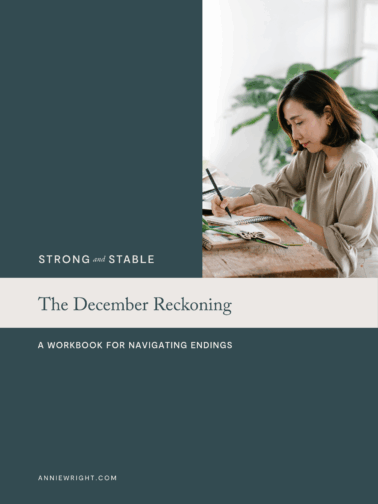Overwhelm.
I’ve yet to meet a person in my therapy practice (or in any other sphere of my life), who didn’t struggle with the modern malady of overwhelm in some way.
Much has been written about the seemingly impossible standards and relentlessly full plates most of us have across all areas of our lives — and I probably don’t need to tell you how much stress, anxiety, and depression it causes when we judge ourselves constantly falling short of “expectations” and the side effects or overscheduling Every. Minute. of our day.
But what’s there to do about it?
What’s to be done when you find yourself in a full-fledged meltdown because you’re JUST TOO OVERWHELMED and you have no idea how to make things feel more manageable in your day-to-day?
It’s a tough place to be in, so in today’s post I want to walk you through a three-ingredient “cure” I often use with my therapy and coaching clients (not to mention with myself) when life gets to be overwhelming.
Read on and see if this recipe for overwhelm “cure” can be applied anywhere in your own life….
Discernment.
So what exactly *is* overwhelm and how do you know when you’re in it and what you need?
Overwhelm, according to Webster’s Dictionary can be defined as:
“: to affect (someone) very strongly
: cause (someone) to have too many things to deal with
: to defeat (someone or something) completely”
Sound familiar?
Strongly affected, too many things to deal with, feeling defeated? Yep.
That’s overwhelm in a nutshell.
And I think that by understanding the literal definition of overwhelm we can use the definition to recognize when and where in our lives we’re experiencing it. For instance:
- Where are you feeling defeated in your life right now?
- In what area(s) do you simply have too much to deal with?
- Which life areas feel particularly emotional or challenging? Where are you strongly affected?
Also, I invite my clients to pay attention to their fantasies, day-time reveries and mind-wanderings that can often alert them not only to overwhelm but also clue them into the life areas that they might most need to tend to and what they most need and want.
For instance, are they daydreaming about ending up in the hospital so that they can actually get taken care of?
Daydreaming about running away to a cottage in the Scottish Highlands to get some space?
Fantasizing about deleting their social media profiles so they can feel a little less exposed?
Each of these reveries (a state in which you are thinking about pleasant things) contains important clues about what you might most need. So let me ask you:
- In times of overwhelm and overcommitment, what do you fantasize about?
- What’s at the essence of that fantasy? (hint: rest, space, support, connection, and security are usually at the core for most of us.)
- What would it look like to start to address the essence of that fantasy in your real, waking life?
This last question is key, because, let’s face it, most of us can’t drop everything and run away to a cottage in the Scottish Highlands, but we *can* start to identify the fact that we need space and less social contact in our daily lives, which can inform how we apply the second ingredient of the overwhelm cure…
Pruning.
So in my yard, I have these gorgeous, abundant fruit trees: figs, Meyer lemons, apples, and persimmons.
One of the things I’ve learned in the last few years of living here and enjoying their delicious fruit each season is this: pruning back the branches and blossoms, while seemingly ruthless to this newbie gardener, is critical if I want to enjoy fully-matured growth of some of the fruit.
What's Running Your Life?
The invisible patterns you can’t outwork…
Your LinkedIn profile tells one story. Your 3 AM thoughts tell another. If vacation makes you anxious, if praise feels hollow, if you’re planning your next move before finishing the current one—you’re not alone. And you’re *not* broken.
This quiz reveals the invisible patterns from childhood that keep you running. Why enough is never enough. Why success doesn’t equal satisfaction. Why rest feels like risk.
Five minutes to understand what’s really underneath that exhausting, constant drive.
This principle — of cutting back or getting rid of the excess so that I can ensure some areas reach full bloom — I believe applies to our everyday lives, too, particularly in times of overwhelm.
I invite my clients in times of overwhelm and overcommitment to reflect not only on what their reveries and daydreams are telling them about what they most need and what that might look like in everyday life but also the big question of:
“What needs to be ruthlessly pruned in your life right now in order for that to happen?”
The reality is, each of us has a finite amount of physical and emotional energy.
Yes, proper diet, sleep, moderate exercise, and other self-care routines can boost our energy levels to a certain extent, but the reality is we’re only human and we all only have 24 hours in a day.
So given that your energy is finite, and given that you might want some of the proverbial fruit on your tree of life goals to mature, what needs to be pruned back in order to make sure enough energy gets to the key areas?
Here are some inquiries to support you in thinking about this:
- What’s a key, underlying goal for your life right now? (hint: is it at the essence of your daytime reveries and fantasies?)
- What, if it “bloomed” would help you achieve a lot of your other goals? For instance, rest, financial security, home organization?
- What are one or two key things that you *know* really have to be prioritized right now? (hint: maybe these things are externally imposed: a big tax bill to pay, a job search that needs to happen…)
- What are five or more examples of things you can ruthlessly prune that are stealing energy away from those key areas?
Boundaries.
Once you’ve identified that you’re in overwhelm, once you’ve become clear on what you most need and want, and clarified what’s possible in terms of pruning, it’s time to take some action to trim back the excess via boundaries.
Boundaries are invisible, dynamic, and multi-faceted “fences” of our lives. They can be physical, emotional, mental, and behavioral and they are precisely what we want to identify, build, and enforce in times of overwhelm.
I’m not going to lie: this may be the hardest part of the three-ingredient overwhelm “cure” for most of us (myself included).
It’s challenging to set boundaries and potentially say no.
To activities, people, and commitments that relentlessly pull for our attention. But learning to do so is critical if we want to reduce our feelings of overwhelm and help those few, key areas of our life blossom. So let me ask you:
- Where, how, and with whom do you need to hold boundaries in your life right now?
- What does it bring up for you to think about tightening boundaries and saying no to people, behaviors, and commitments?
- What did you learn about saying no when you were growing up? Was this supported?
- Who in your life feels safe to practice saying no to? (if the answer is no one, get support with this)
If any of this feels particularly challenging, you’re not alone.
Many of us come from childhoods where we weren’t supported in identifying, stating, and holding our physical, emotional, mental, and behavioral boundaries.
If this was the case for you, the good news is that with skilled support, you can absolutely learn how to do this – no matter where you’re starting from.
And when you learn to hold and state boundaries, you will take great strides towards reducing overwhelm in your life.
The Three-Ingredient Cure for Overwhelm – Moving Forward.
Throughout this post, I’ve used the term “cure” in quotations.
That’s because, realistically, we’re probably never going to cure overwhelm entirely for the rest of our lives.
Unless you’re a monk living in a cave in the Himalayas with your every waking need provided for, you’re probably going to be tested on an ongoing basis with all the many demands modern life holds: work, relationships, commutes, finances, school, friends, family, and more…
But that’s okay because, this practice of discernment, pruning, and holding boundaries is not static: it’s dynamic, ongoing, ever-evolving and something we can learn to help us feel more empowered to deal with the overwhelm that we inevitably encounter as we move through our lives.
Now I’d love to hear from you:
What has supported you in managing and dealing with overwhelm in your own life? What are several areas of your life that might need to be pruned and boundaried right now? Do you have one or two tips, tricks or suggestions of your own that might help others deal with overwhelm?
Here’s to healing relational trauma and creating thriving lives on solid foundations.
Warmly,
Annie





